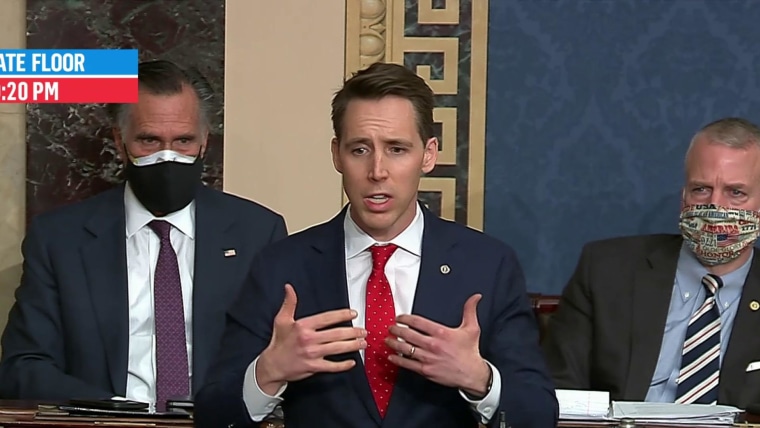On Jan. 7, Simon & Schuster canceled their contract with Sen. Josh Hawley, R-Mo., for his book “The Tyranny of Big Tech,” originally scheduled to be published June 22. In an Instagram post, the publisher wrote that it took this action “[a]fter witnessing the disturbing, deadly insurrection that took place on Wednesday in Washington, D.C.”
Simon & Schuster went on to say: “We did not come to this decision lightly. As a publisher it will always be our mission to amplify a variety of voices and viewpoints; at the same time we take seriously our larger public responsibility as citizens, and cannot support Senator Hawley after his role in what became a dangerous threat to our democracy and freedom.”
Hawley was one of the most outspoken congressional supporters of President Donald Trump’s election fraud lies. He was the first senator to object to the counting of the Electoral College votes and, in a now infamous photo, cheered on the pro-Trump crowd gathered outside the Capitol.
Want more articles like this? Follow THINK on Instagram to get updates on the week’s most important cultural analysis
In response, Hawley railed on Twitter against the “woke mob” at the publishing house and wrote, “…this is not just a contract dispute. It’s a direct assault on the First Amendment. Only approved speech can now be published. This is the Left looking to cancel everyone they don’t approve of.”
Following his use of “woke mob,” I’m sure Hawley is gearing up next to hide behind the buzzword phrase “cancel culture,” when in fact as a member of the Senate, he has one of the most powerful megaphones in the whole country. He hasn’t been canceled; his book contract has. And that’s an important difference.
It’s very possible that Hawley’s contract contained an increasingly common morality clause, which would enable Simon & Schuster to terminate his contract for actions deemed unseemly or unethical. (A Simon & Schuster representative told me they don’t comment on contractual matters.) Whether his contract had a morality clause, the cancellation has nothing to do with the First Amendment, as Hawley claims, and everything to do with his publisher rightly protecting its reputation by severing its association with him. While speech is protected by the First Amendment, it doesn’t require companies to work with anyone to further said speech.
Via email, Iris Blasi, a literary agent at the Carol Mann Agency, told me morality clauses have existed in film contracts dating to the 1920s, but “they started popping up in publishing contracts in just the last four years or so, largely as a reaction of publishers in the #MeToo era seeking to protect themselves from the repercussions of the behavior of their authors.”
“They are broadly written — encompassing not only outright violations of the law but also accusations of defamatory conduct or behavior that would subject the publisher to public condemnation — and thus are widely open to interpretation,” Blasi said.
To give an example, the morality clause in my book contract with a small, independent publisher is included under the header “author’s reputation” and reads in part: “Publisher shall be entitled to terminate this Agreement if the Author is alleged in the public media to have engaged in, or has otherwise been charged with, arrested for, arraigned for, or convicted of, any act of moral turpitude, including without limitation any criminal activity (misdemeanor or felony) or other act of disrepute that would tend to tarnish the Author’s reputation or bring the Author into public contempt.” While it could be argued that “moral turpitude” is indeed a broad term, these clauses are designed precisely for situations like this, where an author’s behavior is deemed by the publisher too far outside the bounds of social norms.
The morality clause in my book contract with a small, independent publisher is included under the header “author’s reputation.”
Books get canceled by publishers for various reasons. Simon & Schuster also canceled Milo Yiannopoulos’s book “Dangerous” in 2017 after a recording surfaced of him questioning the age of consent and saying relationships “between younger boys and older men … can be hugely positive experiences.” Last year, Hachette canceled the publication of Woody Allen’s memoir “Apropos of Nothing,” which was later published by Skyhorse imprint Arcade Publishing.
Hawley’s book, too, is likely to find another home. Tom Spence, president and publisher of the conservative publisher Regnery, told The New York Times it would be interested in publishing Hawley’s book if it was canceled. This undermines the idea that having your booked dropped by one publisher means you are being silenced.
Indeed Hawley, a constitutional lawyer, should know better than to invoke the First Amendment, which reads, “Congress shall make no law respecting an establishment of religion, or prohibiting the free exercise thereof; or abridging the freedom of speech, or of the press; or the right of the people peaceably to assemble, and to petition the Government for a redress of grievances.” The key word here is “Congress.” The First Amendment is concerned with protecting our right to free speech from governmental interference. It does not, however, mean that a publisher has to publish a certain book — or that a social media company has to give voice to a corrupt, dangerous leader.
Hawley, like pretty much every disgraced person before him, is invoking the First Amendment not because he truly believes his rights are being trampled, but because he wants to act the martyr. It’s a classic tactic of anyone trying to blame others when they discover their problematic behavior has consequences. It’s a way of saying, “Side with me, even if we disagree, because you may be next.”
But Hawley’s overblown words are self-serving nonsense. As indicated by Spence, the senator will likely find another publisher, one more aligned with his conservative values, one that doesn’t care that he raised a fist in support of domestic terrorists before they vandalized our nation’s Capitol building. We have to stop letting conservatives hide behind the mantle of the First Amendment when their right to speak has never once been in danger.
One of the reasons I love this country is because we do protect the right to free speech and a free press. I may disagree mightily with Hawley and his ilk but I support their right to express themselves within the bounds of the law. But a book deal is not equivalent to “free speech.” It’s a business contract between an author and a publisher, and therefore subject to the specific terms within said contract. Or, as Mark Cuban put it on Twitter: “Sometimes people decide not to do business with you. It’s their decision.”
The First Amendment is alive and well, and will continue to be. I applaud Simon & Schuster for taking a stand and not supporting an author who clearly has shown total disregard for the sanctity of his own workplace and the safety of our country.
Related:
Source: | This article originally belongs to Nbcnews.com














